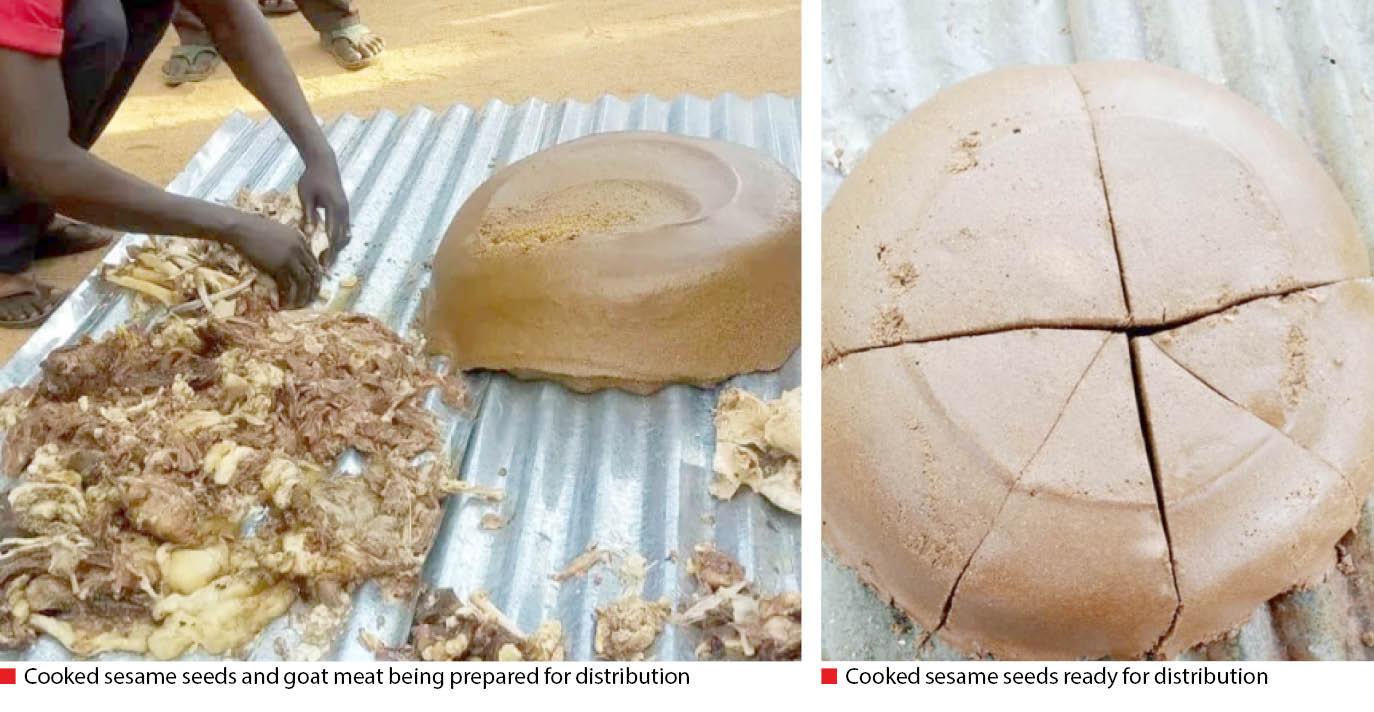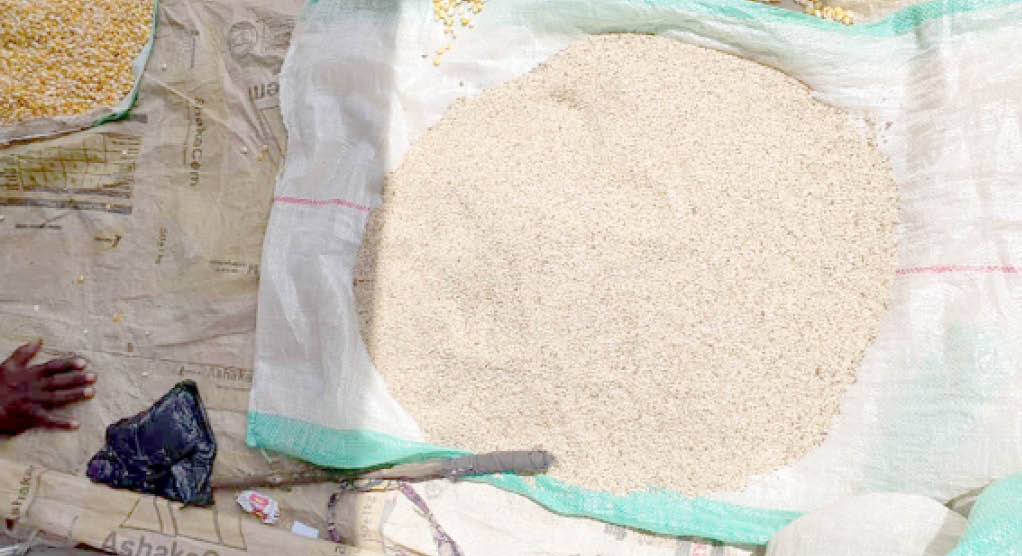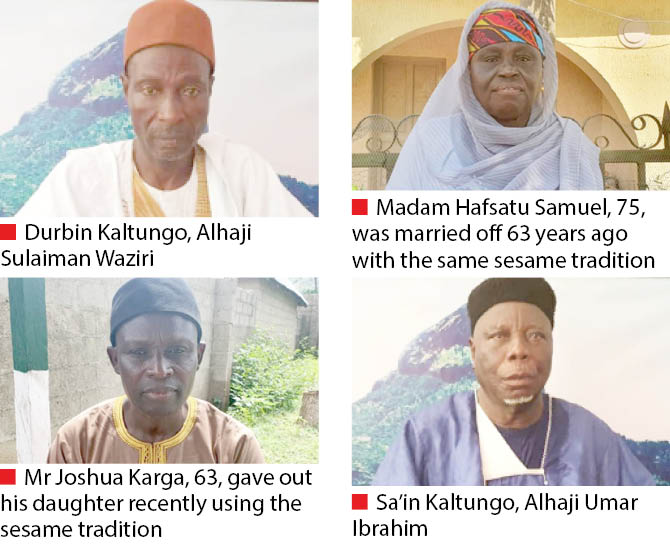How sesame seeds play vital role in Tangale marriage rites
Sesame is an oilseed plant cultivated in several parts of Gombe State for its edible seeds. However, for the Tangale speaking people of Kaltungo and Shongom local government areas of Gombe State, sesame seed is more than a crop because it plays a major role in the traditional marriage rites for Tangale speaking communities of […]

Sesame is an oilseed plant cultivated in several parts of Gombe State for its edible seeds. However, for the Tangale speaking people of Kaltungo and Shongom local government areas of Gombe State, sesame seed is more than a crop because it plays a major role in the traditional marriage rites for Tangale speaking communities of the two LGAs. No marriage is complete without the gift of sesame seeds from the groom to the parents of his prospective bride. Daily Trust Saturday visited the ancient Kaltungo town and reports.
Sesame seeds, popularly known as ‘Ridi,’ is an everyday delicacy for the Tangale people – an agrarian community found in Kaltungo, Shongom and Billiri local government areas, about 76 kilometres from Gombe, the capital of Gombe State.
Sesame seeds are very small and come in many colours depending on the cultivar. The most traded variety of sesame is that of the off-white colour. Other common colours are buff, tan, gold, brown, reddish, gray and black. The seeds, which contain carbohydrate, fat and protein, are eaten by people mostly as snacks or desserts.
Durbin Kaltungo, Alhaji Sulaiman Waziri, told Daily Trust Saturday that the Tangale ethnic group are categorised into two, Tangale East, which comprises of the Kaltungo township where the Kaltungo chiefdom is based, Ture town and the neighbouring Shongom Local Government Area.
“The eastern Tangale based in Kaltungo chiefdom came into existence in 1903 after the defeat of the Sokoto Caliphate, when the colonialists decided to unite the several small ethnic groups in the old Gombe Division under one umbrella. So, the Kaltungo Chiefdom was created under the first Mai Kaltungo, Mai Lamai, in 1903.
“If we talk about Tangale as an ethnic group, we are the same as Tangale of Billiri, we are all from the Chadic family of northern Nigeria. From the Northeast, our last base was around Chad Basin with Bolewa, Kanakuru, Gizimawa and Karekare among others. We have different languages and dialects, but some words are similar and interchanged,” he said.
According to him, even before the coming of Islam and Christianity, which are the two dominant religions, “the people of Tangale have a system of procreation, which is conducted through marriage.”
Sa’in Kaltungo, Alhaji Umar Ibrahim, explained how marriage rites commence in Tangale from time immemorial.
He said, “Whenever a man sees a woman he intends to marry, he will inform his parents, who will go and meet her parents to inform them of the proposal. That is, even before the advent of Islam or Christianity. There must be this formal introduction before a marriage can take place.
“After that, two big basins of cooked Sesame seeds, two goats and two chickens will be presented to the bride’s family as a pre-marital gift. The big basin of sesame is for the father, while the small basin is for the mother; it would be distributed to family and friends as a sign of the upcoming marriage.
“Also, as part of the marriage rites, the groom will invite his friends to work in the farm of his father-in-law, however he can instead give money in-lieu of such tradition. In the past, iron was used as money, it subsequently changed to cowries and later the present money we have.

Why Sesame seeds is chosen above other crops
Although the people of Kaltungo cultivate several food and cash crops such as sorghum, millet, bambara nut, groundnut, rice and sesame, according to Durbin Kaltungo, sesame seeds were chosen because they are the most sacred and important of all the crops grown in Tangale area.
“Marriage is the most revered institution; hence the most important crop was chosen to be part of it. It is like the Hausas who use kola nut to conduct their weddings,” he explained.
He added that, “With the advent of Islam, our forefathers looked into it and discovered that there was no harm or anything that goes against Islam, hence the tradition has continued to date.
“However, some families, especially the Muslims among us, collect money in-lieu of the sesame, or dresses to be bought by the groom’s family, especially if the groom is not from Tangale land.”
Corroborating that, Sa’in Kaltungo said they have marriages across the two major religions. “It is common to find adherents of different religions within the same family. So, whenever a stranger wants to marry from here, we help each other in explaining the rituals and simplifying it.
“Therefore, for the people who will find it strange, we ask for money in place of the sesame seeds, goats and chickens on his behalf, to avoid problems.
“But no matter what, there must be sesame before a marriage can take place, even today. Though our Christian brothers practice it more, because in Islam one has to discard anything that is against the teachings of the religion, we have that understanding because it is a pre-marital gift not the actual dowry,” he explained.
Investigation by Daily Trust Saturday revealed that a bag of Sesame seeds cost over N130,000 during its peak, and a groom is required to provide the equivalent of two bags before he can meet the required amount of cooked sesame.
However, Usman Ibrahim Durbin Kaltungo stated that “The significance of asking the groom to bring sesame, which is always expensive, before he can be given a bride, is to ascertain that he is ready and capable of taking care of her and taking other responsibilities as a husband after marriage,” he stated.
Marriage can be conducted on credit
However, Usman Manga Lakwada, a staff in the Kaltungo Chiefdom Council, said in the past, marriages were conducted without formal payment of bride price if the groom presents sesame seeds to the bride’s family.
“In the past, if one took sesame seeds to his bride’s family and later cannot afford to proceed with the other wedding expenses, the woman can still be given to him to stay until he can afford the other marriage rites.
“If the couple has a daughter and the man hasn’t fulfilled his wife’s marriage rite by the time their daughter is ripe for marriage, then whatever is brought to him by his daughter’s suitor would be taken to his in-laws, to repay the debt of marrying the girl’s mother without concluding the marital rites.”
According to Mr Lakwada, marriage between cousins is strongly discouraged in Tangale culture.
“Marriage between people of the same lineage is not allowed. This is to avoid spread of hereditary diseases like leprosy and other diseases that can be inherited.
“It is believed that marrying within the same clan will bring about the continuation of such diseases. So, these are some of the impediments of marrying from the same clan.
“But with the coming of Islam, parents strongly discourage it but they cannot outrightly ban it, since it is allowed in Islam. In our culture, marrying from the same clan is like one doesn’t value the kinship,” he said.
What constitutes marital rites in Tangale
Durbin Kaltungo explained that for a marriage to take place in Tangale land, the groom must provide sesame seeds, two goats, two chickens and money, which all form parts of the premarital gift, similar to kola nut and sweet distributed by the Hausa/Fulani during their wedding.
“For the marriage ceremony, again two goats, two chickens and money which is the bride price must be presented before a wedding can take place,” he said.
Joshua Baka Karga, 63, a father of seven, narrated how the marriage rites and ceremony took place when he married his wife over 35 years ago.
“When I found the woman I wanted to marry, I informed my parents who went and met her parents and informed them of my intention to marry their daughter.
“They then presented the cooked sesame seeds and two goats. During the wedding ceremony, another two goats, two chickens and N10,000 were presented to them. These items and money are what constitutes Tangale marriage rites,” he said.
According to him, in the past, a groom had to organise his friends to work in the farm of his potential in-laws. “But he can also give money in-lieu of working at the farms. Then, a date will be fixed for the wedding. All these can be done almost at the same time, so fixing the date of the wedding depends on how well prepared one is. However, the woman can be given to you even before the wedding rites, once you take the sesame seeds and the goats to them,” he added.
Karga also stated that if one doesn’t have the financial wherewithal for the wedding expenses, he can be given the woman on credit.
“Also, if the courtship took longer without you proposing for marriage, another suitor who he is ready can be given the wife.”
Mr Lakwada stated that the high cost of sesame often prevent some youth from getting married.
“We have the challenge of waiting for too long because of the lack of the sesame seeds, as well as the high cost. So, the man has to wait, sometimes, for months before he can get it. So, to prevent promiscuity among the youth, the penalty for impregnating a girl before marriage is far more expensive than the items that one will present for marriage.
“This has helped in reducing promiscuity and the rate of unwanted pregnancies among our children,” he explained.

Boost in sesame farming in the area
It was gathered that the Tangale people plant sesame for so many reasons. However, being central in marriage rites, it is one of the most sought-after crops in the area.
“Some families keep the sesame seeds to be given to people whenever they want to marry. It is a thing of pride for your friends or neighbours to come to you and ask for sesame to conduct a wedding. It can be given on credit pending when one can afford to pay back.
“Therefore, people generally harvest sesame seeds here because it is valuable and a thing of pride for our people,” Sa’in Kaltungo added.
Karga explained that sesame seeds are used to announce that a girl is about to get married.
“The tradition has made sesame one of the sought-after crops here. Therefore, our neighbours who produce sesame bring them here because it has more value here.
“Modernisation has not affected this wonderful culture, so when I gave out my daughter’s hand in marriage three years ago, the suitor and his family had to follow the same procedure.
However, if it is a stranger from another place that wants to marry our daughter, there is some leniency, he can give us money to buy the sesame or bring the sesame raw and the girl’s parents will process it,” Karga added.
He, however, complained that an alien culture of providing furniture for the bride is creeping into our culture, “Unlike in the past when the woman will just come alone, it was the responsibilities of the husbands to provide all these things.
“This is an unfortunate development that has made the marriage to be more expensive, thereby promoting promiscuity in the society.
“But we believe such practices helped in reducing the rate of divorce in our society, unlike in other cultures where the rate of divorce is high, even though it makes the marriage very expensive,” he stated.
Daily Trust Saturday gathered the sesame seedlings planted in June lasts three months before harvesting.
It was discovered that people of Kaltungo and other Tangale speaking people of Ture and Shongom planted sesame seeds in their farms to reduce the cost of buying the seeds from traders, which is very expensive.
As a smallholder farmer, Joshua Karga said he harvests about 15 bags annually from his farm.
“Also, the coming of companies to buy the commodity has made it very expensive. Most families planted the sesame seeds for the purpose of conducting marriages, hence other people bring their sesame seeds here to sell at a higher price,” he explained.
Hussaini Musa Waziri, a sesame seeds trader for over 25 years, explained the reason behind the boost in the business.
He said in the past, they travelled to far places to buy the seeds due to the high demand. “What is being produced here is mainly for marriage purposes and it is not enough, therefore neighbouring communities and even farmers outside the state used to bring it here to sell because of the market value.
“As a result of that, our people started to plant it in large quantities to avoid the higher prices. This development attracted large scale companies to Kaltungo to buy the sesame seeds. Therefore, now, sesame is more of a cash crop as more people are into sesame farming.
“Because companies come to buy the product, we now sell the seeds in kilos. The market has a boost because the companies purchase the sesame in large quantities,” Waziri said.
He added that, “Last year, a bag was sold at between N120,000 and N130,000, but during the harvest season, it is sold for around N90,000.
“But despite the high price, our people still buy it for marriage purposes, the same way Hausa people use kola nut to conduct their marriages. Also, the big companies in addition to the marriage purposes also played a role in making the seeds to be expensive.
Rooted in culture than religion
Even though the tradition of using sesame seeds as part of marriage rites is rooted in Tangale culture rather than religion, it was gathered that these days, it is practiced more by the Christian faithful and other traditional devotees.
“When I gave out my daughter in marriage last year, I had to buy the sesame seeds, cooked and distributed to my Christian relatives and neighbours because this is the only sign that shows that I respect them.
“If I refuse to honour that cultural aspect, some of them will not attend the ceremony because it will translate as I didn’t invite them, even if I sent them dozens of wedding cards” Dandadi Adamu, a resident of Kaltungo said.
He also explained why the Muslim faithful are lenient with that traditional custom.
Malam Adamu stated that “Sesame seeds are expensive; Islam always simplifies things for Muslims. So, the Muslim no longer prioritises the sesame tradition, in order to make it easier for the would-be husband and his family in accordance with the teaching of Islam.
“But if the person is affluent and feels he can do it, there is no problem because the tradition has nothing to do with any religion,” he explained.
Foreign culture creeping into Tangale tradition
Hafsatu Samuel, 75, got married at the age of 12 in 1963 and the marriage was blessed with six children.
She told Daily Trust Saturday that during her wedding ceremony, the sesame tradition was observed.
“I can still remember that two big basins of cooked sesame seeds were brought to our house. The quantity of the sesame seeds depends on the financial strength of the suitor. Two goats and two chickens were brought as part of the pre-marital rites.
“During the wedding ceremony, two additional goats were brought to my parents. If the husband is a small income earner, it is a big and small basin, but if he is affluent, he can bring two big basins, like in my case, they presented two big basins,” she said.
However, Madam Hafsatu lamented the changes courtesy of foreign cultures creeping into Tangale tradition.
“Now, not all families practice it strictly as it was done in the past, especially in the event that the girl got pregnant before the marriage rites are properly conducted.
“We no longer do the rites of bringing goats before the wedding can take place as punishment. Now, both families will just brush it off and go ahead to conduct the wedding.
“But notwithstanding, even today, a girl that sesame seeds were brought to her parents before marriage has a special status in the society compared to a girl whose parents did not receive such a thing,” she affirmed.
How the sesame is presented
The sesame seeds are fried, grinded and cooked before it is taken to the bride’s family. Also, the goats are slaughtered and distributed among the family of the bride, which signals to her family members that the girl is engaged.
The big basin in which the seeds were taken to the bride’s family will be returned to the bridegroom’s family filled with assorted foodstuff as a gift, which is also a signal that the proposal is accepted.
